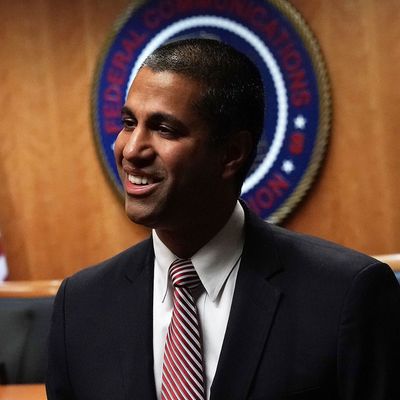
In a vote split 3-2 along party lines, the Federal Communications Commission voted this afternoon to repeal net-neutrality rules that protected consumers from their internet-service providers, undoing regulations that ensured a fair and open internet.
Net neutrality, if you’ve managed to avoid any of its fiercely protective proponents online, is the simple principle that ISPs like your cable or telephone company are required to treat all internet traffic equally. They’re not allowed to show preferences to certain sites or services, either by speeding them up, slowing them down, or blocking them entirely.
Or they weren’t, until now. The rollback, titled Restoring Internet Freedom, moves regulatory control of ISPs from the FCC back to a toothless Federal Trade Commission. Ajit Pai, the former Verizon lawyer and current FCC chairman spearheading the policy, said during today’s hearing that undoing the regulations would spur investment in broadband deployment, which sounds great, except that ISPs have freely admitted that the net-neutrality protections didn’t significantly affect their investment in that area.
Fellow commissioner Brendan Carr argued that the free market and consumer choice would ensure that ISPs don’t decide to throttle, block, or alter the content that customers request — which, again, great! Except that the FCC’s own data shows that 50 percent of American households don’t have a choice in who their broadband provider is.
Over the course of the last year, Pai has steamrolled ahead with this regulation despite not holding a single hearing on the subject; despite the fact that the FCC’s public comment system was abused, flooded with fake identical comments signed by people who later said they never submitted anything; and despite the fact that net neutrality is one of the few issues with strong bipartisan support. (If there’s one thing that unites Americans, it’s love of cheap streaming video and hatred of their cable companies.)
Still, Pai, Trump, and the ISPs now have what they what. What does this mean for you? Despite the dire warnings of dedicated activists, it won’t mean much — in the short term, at least. Among other things, it does mean that you’ll have to be a lot more vigilant about paying attention to what your ISP is promising. Regulatory authority of ISPs is returning to the FTC, which punishes violations through lawsuits and fines instead of preemptive action; if your ISP is transparent about how it’s screwing you over, there’s not much to be done. (Shortly ahead of today’s vote, Comcast removed a promise not to discriminate against certain types of traffic. In effect, if they don’t create a pledge they later violate, then it’s not a deceptive business practice.)
In the long term, though, the internet could get slower, dumber, and more expensive. While it’s nice to imagine ISPs competing against one another to promise net neutrality, as most of us know from our own lives, it’s rare to have very much choice in how you access the internet. What you can expect instead is ISPs throttling, or slowing down, traffic they don’t like very much — BitTorrent downloads, say, or streaming video.
What can be done? There are better options available to consumers besides yelling at Pai on Twitter, as good as that might feel. Strong and sustained interest in net neutrality over the past year has made it likelier than ever that Congress might take action (and again, Democratic and Republican constituencies largely agree on this issue).
In the meantime, expect this issue to remain before the court for a few years. New York’s Attorney General announced shortly after the vote that the state would sue to uphold net neutrality, and there is precedent to support that. The 2015 Open Internet Order was upheld by a court this past summer, which, as commissioner Jessica Rosenworcel pointed out, gives the 2015 protections strong legal standing, contrary to what Pai believes.
Today’s vote is a bummer, but hardly a surprise. In the meantime, your internet service should remain largely unaltered, at least until the dust settles and your ISP gets to work carving up the internet into fiefdoms.





























